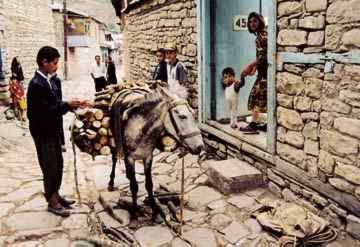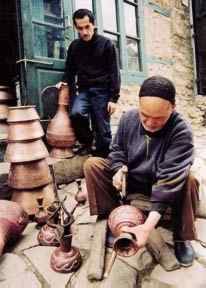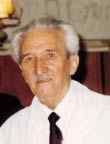
Autumn
1999 (7.3)

Just for
Kids
The Day
They Burned Our Books
by Asaf
Rustamov

 When Asaf Rustamov
(pronounced AH-saf ru-STAM-ov) was a young boy, they didn't have
television or even radio, so he loved reading books. But one
day an order came to burn all of the books in his village. Asaf
never forgot that day even though it happened 70 years ago.
When Asaf Rustamov
(pronounced AH-saf ru-STAM-ov) was a young boy, they didn't have
television or even radio, so he loved reading books. But one
day an order came to burn all of the books in his village. Asaf
never forgot that day even though it happened 70 years ago.
Photo: In the village of Lahij
high in the Caucasus mountains today. Courtesy: BP.
The problem was that the books in his village were written in
an alphabet that the new leaders in Asaf's country didn't like.
The books were written in Arabic script, an alphabet that had
been used in that region for more than 1,200 years.
Imagine having to start over and learn a new set of ABCs and
forget the old ones! And what if your favorite books were burned
just because they were in the old alphabet that some people thought
was "wrong"?
_____
 It was July
1928. Summer holidays.
It was July
1928. Summer holidays.
I was 10 years old and had just finished 5th grade.  We
lived in Lahij (pronounced lah-HEEJ), a village high up in the
Caucasus Mountains in Azerbaijan.
We
lived in Lahij (pronounced lah-HEEJ), a village high up in the
Caucasus Mountains in Azerbaijan.
Photo:
Making copperware
is a traditional craft in the village of Lahij. Courtesy: BP.
Even today, it's difficult to travel the mountain roads to reach
Lahij. In winter months when it rains or snows a lot, it's too
dangerous to drive, even with a jeep or a four-wheel-drive vehicle.
The narrow dirt road hugs the side of the mountain. You have
to be careful not to get too close to the outer edge, which drops
straight down to a river far, far below. There are no guardrails
on the road to keep you from driving right off the side of the
mountain.
As a child, I remember how excited we used to be when visitors
came to our village. One day I was sitting on our balcony when
suddenly I saw seven men galloping up on horses. No one knew
what they wanted. We learned that they were government leaders.
They told us to gather at the village square because they had
something to tell us. "Everybody bring your books and dump
them in a big pile in the middle of the village. Bring all your
books from your homes. Don't hide a single one of them. If you
do and we find out, we'll put you in jail. Bring all your books
by 5 o'clock today. Then we'll make a big fire and burn them."
We couldn't believe his words. What? Burn our books?! But we
loved our books. Why burn them?
Azerbaijan was not free like it is today. The new government
that ruled over us wanted us to read books that were written
with a new alphabet. They didn't want us to read the Arabic alphabet
anymore because our Holy book, the Koran, was written in it.
The Koran is for Muslims like the Bible is for Christians or
the Torah for Jews. The government didn't want us to read the
Koran and practice our religion anymore. They didn't want us
to believe in God anymore. But other books were printed in Arabic
as well-not just the Koran. We had used the Arabic alphabet for
1,200 years. We had poetry books, literature books, science booksbut
it didn't seem to matter-we had to burn them all.
The people were afraid to disobey. With tears in their eyes,
they brought their books to the center of the village and put
them on a pile that grew so high that it could have filled two
trucks. There were more than a thousand books.
I couldn't understand why anyone would want to burn our books.
We lived so far away from any stores so we couldn't get new ones
easily. We didn't have TV. We didn't have radio. We needed our
books to learn things. What would we do without them? Although
it was risky to hide any books, I found out later that some people
buried their books so they could read them in the future.
This terrible tragedy took place when Joseph Stalin was the leader
of our country. Stalin ruled our country from 1924 until 1953,
when he died. Most people think he was one of the cruelest rulers
of the century. When he became the leader of the Soviet Union,
he did his best to make people stop believing in God. He even
dynamited huge mosques and churches so people would not be able
to worship together.
If Stalin and his followers didn't like someone, they would send
him to a prison far, far away from his home. Often, that person
was never heard from again. People were afraid. No one knows
exactly how many millions of people died this way.
Later I learned that it wasn't just our village where the Arabic
books had been burned. It happened throughout Azerbaijan and
also in nearby republics such as Kazakhstan, Turkmenistan, Uzbekistan,
Tajikistan and Kyrgyzstan, wherever there were books written
in the Arabic alphabet.
It's a terrible thing to burn a book-it's like murdering children
along with their future children, grandchildren and great-grandchildren.
Burning books means that all of the knowledge that grownups discovered
and wrote down is lost and cannot be passed down to future generations.
Kids have to start all over again. It's an enormous tragedy!
Burned
Again
I was
a soldier in World War II. When I came back to Azerbaijan, we
were having a really hard time in our country. People were hungry
and couldn't find jobs, so they began selling some of the old
books that they had hidden earlier. Since I loved books and could
read the Arabic writing, I bought as many as I could find. This
happened around 1949.
My favorites were very rare books about medicine that were hundreds
of years old. I had an old handwritten copy of a book by Avicenna,
who was one of the first doctors in the world to write down his
ideas about medicine (11th century). At that time, the Arabic
alphabet was used in all of the surrounding countries.
After I started collecting these books, I ran into trouble. An
old friend of mine told me that the secret police-the KGB-was
watching me. The KGB used to spy on people to find out if they
were doing anything that the government didn't like. "They're
watching your house. You can't take the books away. You'd better
burn them, or else someone will come after you," my friend
told me.
And so again, for the second time in my life, I had to burn the
things that I loved the most-my books. All those rare medical
books that I had found and bought one by one had to be destroyed.
I had no choice. Either I had to burn my books or go to prison
or be killed. So my wife and I burned those precious books in
the fireplace. We were so sad. The tears rolled down our faces
as we watched the flames eat up our precious books.
 So much medical
knowledge was lost forever from those
So much medical
knowledge was lost forever from those 
books. Azerbaijanis used to know of more than 400 plants
that were used for making medicine. People knew how to take the
leaves, stalks, flowers, roots and seeds and use them to treat
specific diseases. Today we only know of about 50 plants growing
in our country that can be used to heal people when they get
sick. I don't think we will ever recover the knowledge from those
books that were burned so long ago. It was a terrible crime and
many generations will suffer for years and years to come.
Betty Blair, Editor of Azerbaijan International, inter-viewed
Asaf Rustamov (1918-1997) in 1995 in relation to his work on
the history of herbal medicine in Azerbaijan. Aynur Hajiyeva,
Marjan Abadi and Jala Garibova also contributed to this article.
From Azerbaijan International
(7.3)
Autumn 1999.
© Azerbaijan International 1998. All rights reserved.
Home
| About
Azeri | Learn
Azeri | Arabic
Script | Store | Contact
us
Articles from Azerbaijan
International
© Azerbaijan International. Copyright 2002. All rights reserved.
|
|
 |
Just for
Kids
The Day
They Burned Our Books
by Asaf
Rustamov

![]() When Asaf Rustamov
(pronounced AH-saf ru-STAM-ov) was a young boy, they didn't have
television or even radio, so he loved reading books. But one
day an order came to burn all of the books in his village. Asaf
never forgot that day even though it happened 70 years ago.
When Asaf Rustamov
(pronounced AH-saf ru-STAM-ov) was a young boy, they didn't have
television or even radio, so he loved reading books. But one
day an order came to burn all of the books in his village. Asaf
never forgot that day even though it happened 70 years ago.
Photo: In the village of Lahij
high in the Caucasus mountains today. Courtesy: BP.
The problem was that the books in his village were written in
an alphabet that the new leaders in Asaf's country didn't like.
The books were written in Arabic script, an alphabet that had
been used in that region for more than 1,200 years.
Imagine having to start over and learn a new set of ABCs and
forget the old ones! And what if your favorite books were burned
just because they were in the old alphabet that some people thought
was "wrong"?
_____
 It was July
1928. Summer holidays.
It was July
1928. Summer holidays.
I was 10 years old and had just finished 5th grade. ![]() We
lived in Lahij (pronounced lah-HEEJ), a village high up in the
Caucasus Mountains in Azerbaijan.
We
lived in Lahij (pronounced lah-HEEJ), a village high up in the
Caucasus Mountains in Azerbaijan.
Photo:
Making copperware
is a traditional craft in the village of Lahij. Courtesy: BP.
Even today, it's difficult to travel the mountain roads to reach
Lahij. In winter months when it rains or snows a lot, it's too
dangerous to drive, even with a jeep or a four-wheel-drive vehicle.
The narrow dirt road hugs the side of the mountain. You have
to be careful not to get too close to the outer edge, which drops
straight down to a river far, far below. There are no guardrails
on the road to keep you from driving right off the side of the
mountain.
As a child, I remember how excited we used to be when visitors
came to our village. One day I was sitting on our balcony when
suddenly I saw seven men galloping up on horses. No one knew
what they wanted. We learned that they were government leaders.
They told us to gather at the village square because they had
something to tell us. "Everybody bring your books and dump
them in a big pile in the middle of the village. Bring all your
books from your homes. Don't hide a single one of them. If you
do and we find out, we'll put you in jail. Bring all your books
by 5 o'clock today. Then we'll make a big fire and burn them."
We couldn't believe his words. What? Burn our books?! But we
loved our books. Why burn them?
Azerbaijan was not free like it is today. The new government
that ruled over us wanted us to read books that were written
with a new alphabet. They didn't want us to read the Arabic alphabet
anymore because our Holy book, the Koran, was written in it.
The Koran is for Muslims like the Bible is for Christians or
the Torah for Jews. The government didn't want us to read the
Koran and practice our religion anymore. They didn't want us
to believe in God anymore. But other books were printed in Arabic
as well-not just the Koran. We had used the Arabic alphabet for
1,200 years. We had poetry books, literature books, science booksbut
it didn't seem to matter-we had to burn them all.
The people were afraid to disobey. With tears in their eyes,
they brought their books to the center of the village and put
them on a pile that grew so high that it could have filled two
trucks. There were more than a thousand books.
I couldn't understand why anyone would want to burn our books.
We lived so far away from any stores so we couldn't get new ones
easily. We didn't have TV. We didn't have radio. We needed our
books to learn things. What would we do without them? Although
it was risky to hide any books, I found out later that some people
buried their books so they could read them in the future.
This terrible tragedy took place when Joseph Stalin was the leader
of our country. Stalin ruled our country from 1924 until 1953,
when he died. Most people think he was one of the cruelest rulers
of the century. When he became the leader of the Soviet Union,
he did his best to make people stop believing in God. He even
dynamited huge mosques and churches so people would not be able
to worship together.
If Stalin and his followers didn't like someone, they would send
him to a prison far, far away from his home. Often, that person
was never heard from again. People were afraid. No one knows
exactly how many millions of people died this way.
Later I learned that it wasn't just our village where the Arabic
books had been burned. It happened throughout Azerbaijan and
also in nearby republics such as Kazakhstan, Turkmenistan, Uzbekistan,
Tajikistan and Kyrgyzstan, wherever there were books written
in the Arabic alphabet.
It's a terrible thing to burn a book-it's like murdering children
along with their future children, grandchildren and great-grandchildren.
Burning books means that all of the knowledge that grownups discovered
and wrote down is lost and cannot be passed down to future generations.
Kids have to start all over again. It's an enormous tragedy!
Burned
Again
I was
a soldier in World War II. When I came back to Azerbaijan, we
were having a really hard time in our country. People were hungry
and couldn't find jobs, so they began selling some of the old
books that they had hidden earlier. Since I loved books and could
read the Arabic writing, I bought as many as I could find. This
happened around 1949.
My favorites were very rare books about medicine that were hundreds
of years old. I had an old handwritten copy of a book by Avicenna,
who was one of the first doctors in the world to write down his
ideas about medicine (11th century). At that time, the Arabic
alphabet was used in all of the surrounding countries.
After I started collecting these books, I ran into trouble. An
old friend of mine told me that the secret police-the KGB-was
watching me. The KGB used to spy on people to find out if they
were doing anything that the government didn't like. "They're
watching your house. You can't take the books away. You'd better
burn them, or else someone will come after you," my friend
told me.
And so again, for the second time in my life, I had to burn the
things that I loved the most-my books. All those rare medical
books that I had found and bought one by one had to be destroyed.
I had no choice. Either I had to burn my books or go to prison
or be killed. So my wife and I burned those precious books in
the fireplace. We were so sad. The tears rolled down our faces
as we watched the flames eat up our precious books.
 So much medical
knowledge was lost forever from those
So much medical
knowledge was lost forever from those ![]()
books. Azerbaijanis used to know of more than 400 plants
that were used for making medicine. People knew how to take the
leaves, stalks, flowers, roots and seeds and use them to treat
specific diseases. Today we only know of about 50 plants growing
in our country that can be used to heal people when they get
sick. I don't think we will ever recover the knowledge from those
books that were burned so long ago. It was a terrible crime and
many generations will suffer for years and years to come.
Betty Blair, Editor of Azerbaijan International, inter-viewed
Asaf Rustamov (1918-1997) in 1995 in relation to his work on
the history of herbal medicine in Azerbaijan. Aynur Hajiyeva,
Marjan Abadi and Jala Garibova also contributed to this article.
From Azerbaijan International
(7.3)
Autumn 1999.
© Azerbaijan International 1998. All rights reserved.
Home
| About
Azeri | Learn
Azeri | Arabic
Script | Store | Contact
us
Articles from Azerbaijan
International
© Azerbaijan International. Copyright 2002. All rights reserved.